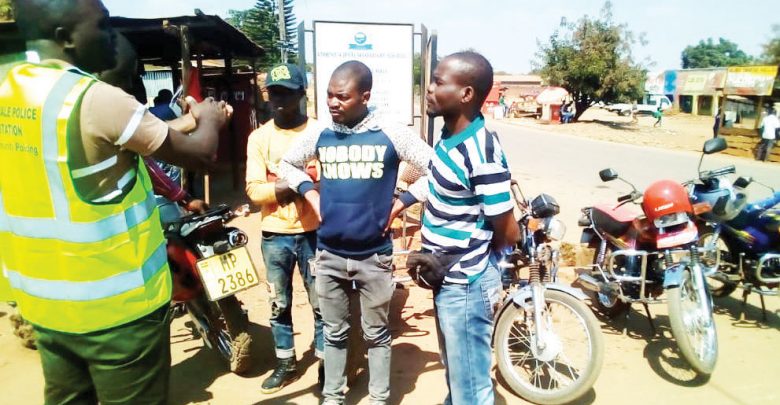Africa-Press – Malawi. Ordinarily, a ride or die is supposed to be one’s best or closest friend who would not hesitate to give up their life for you, if the worse comes to worst. But now it appears the term ride or die has changed meaning, at least in a Malawian context; where it is now a choice that people involved in public transport, in particular motorbike taxi operators, are faced with; to stay idle or risk their lives by operating their taxi business.
It is early hours of Friday, July 02 at Mponela, in Dowa District, and a kabaza [motorcycle-taxi] operator has been killed. Pemphero Biyati, 25, met his fate along Dzoole earth road after thugs pounced on him. He was robbed of his groceries, not his bike.
His killers are still on the run, according Police. Prior to the murder, another kabaza operator, Lari Malimbika, was also targeted. He lost both his life and the motorcycle-taxi. Malimbika’s death sparked anger among his colleagues. They descended on Mponela Police Station, demanding quick response.
“We want Lari’s killers arrested immediately,” one kabaza operator, who chose not to be named, said at the time. “Yes we want to get justice for our friend. But we feel Police are too slow to act.” A week later, one suspect, Gelisoni Richard, was arrested in connection to the murder. He is facing a murder charge.
In Lilongwe, two more riders were also murdered in cold blood. On one night in May, in Falls, which is close to Old Town, Moses Chapata was slain and robbed of his bike. At the time, he was ferrying his expectant wife to Bwaila District Hospital. The wife, too, was attacked and left injured. And on the night of June 27, Owen Chawanda, 27, was also ambushed by thugs in Midland in Area 23. He died of his injuries at Kamuzu Central Hospital. A manhunt led to the arrest of one suspected killer, Moses Eliya, 21. Police recovered Chawanda’s bike from him.
Attacks targeting kabaza operators are not uncommon. Malawi has witnessed a series of kabaza killings. When these operators work in the dark, they often get into harm’s way. Ironically, a good number of kabaza men tend to ply their trade during odd hours; a time thieves thrive. The question remains; why do these riders prefer the shadows of darkness to daytime?
Luka Joseph, an operator at Likuni rank in the capital city, said kabaza riders make a lot of money during the night. “During the day, you can be charged K500 from Likuni to Chinsapo. At night, you can cough double, or even more,” Joseph, a former boxer, explained. But the lure of the night comes with a price, he admitted. According to Joseph, those who venture into the night do not wish themselves well.
“I was once a night rider. But I stopped after I fell into the hands of thugs in Unit Six area. I fought them off, thanks to my boxing skills. I was left seriously injured on my back and arms,” he recalled, adding “I strongly urge my fellow riders to think twice before they fall for the night. What good is there to lose your life in search of big fortune?”
Sheriff Kaisi, a security analyst and political science lecturer, shared Joseph’s sentiments. He said kabaza operators must take their lives seriously.
“Trouble is the increasingly targetted violence they’re facing, particularly during the night. Sadly, they seem to ignore such threats, at their own risk. This is very bad. It’s good kabaza operators place the value of their lives above everything,” he said.
Malawi Police Service spokesperson, James Kadadzera, said the law enforcers are trying to enhance efforts to prevent attacks against kabaza riders. This, he said, is being done through a series of sensitisation meetings across the country.
“Police officers are always on the ground hitting every nook and corner, dating motorcycle-taxi operators. They’re sensitising them to the dangers of working during odd hours as well as operating bikes which are not roadworthy. What we can advise these operators is to stay away from the night since prevention is better than cure,” Kadadzera said.
In May this year, Lilongwe Police Station gathered scores of kabaza riders to chart way forward regarding their safety. The nearby Kawale Police Station also borrowed a leaf following attacks in Area 23 and Area 24.
Even the leadership of kabaza operators in Lilongwe is now left confused. According to Wyson Khondiwa, President of Lilongwe Urban Kabaza Association, most of the riders tend to throw caution to the wind.
“We’ve been advising these boys to refrain from working during the night. But they don’t take heed,” Khondiwa lamented. “Perhaps they will take our advice when they’re either stabbed or escorted to the grave.”
Malango Mwasinga, Lilongwe Police Station’s Community Policing Coordinator, had offered the operators two choices: work in the night and be killed or operate within normal hours and be saved. But it is quite clear that kabaza riders have settled for the night choice and chosen to ride into hell.






